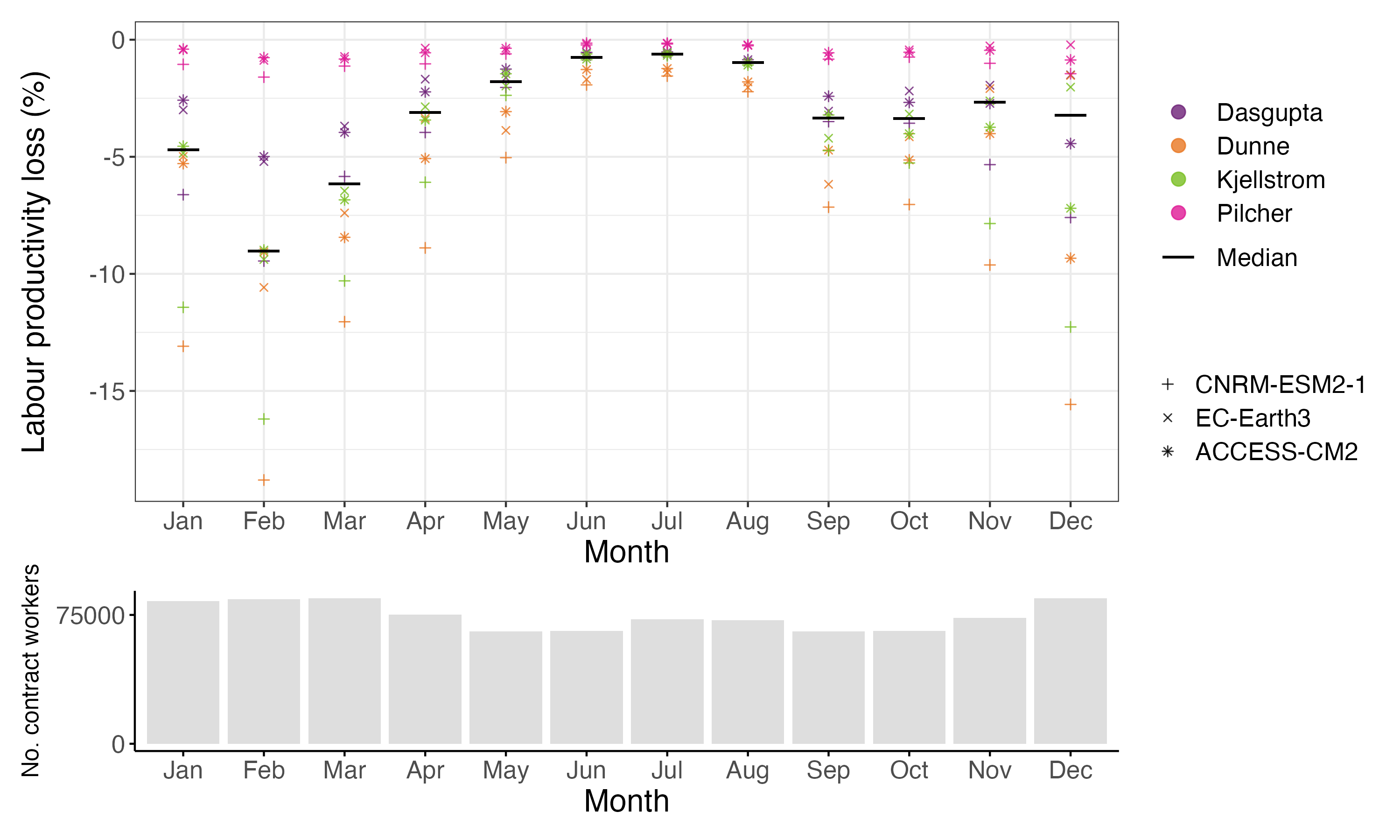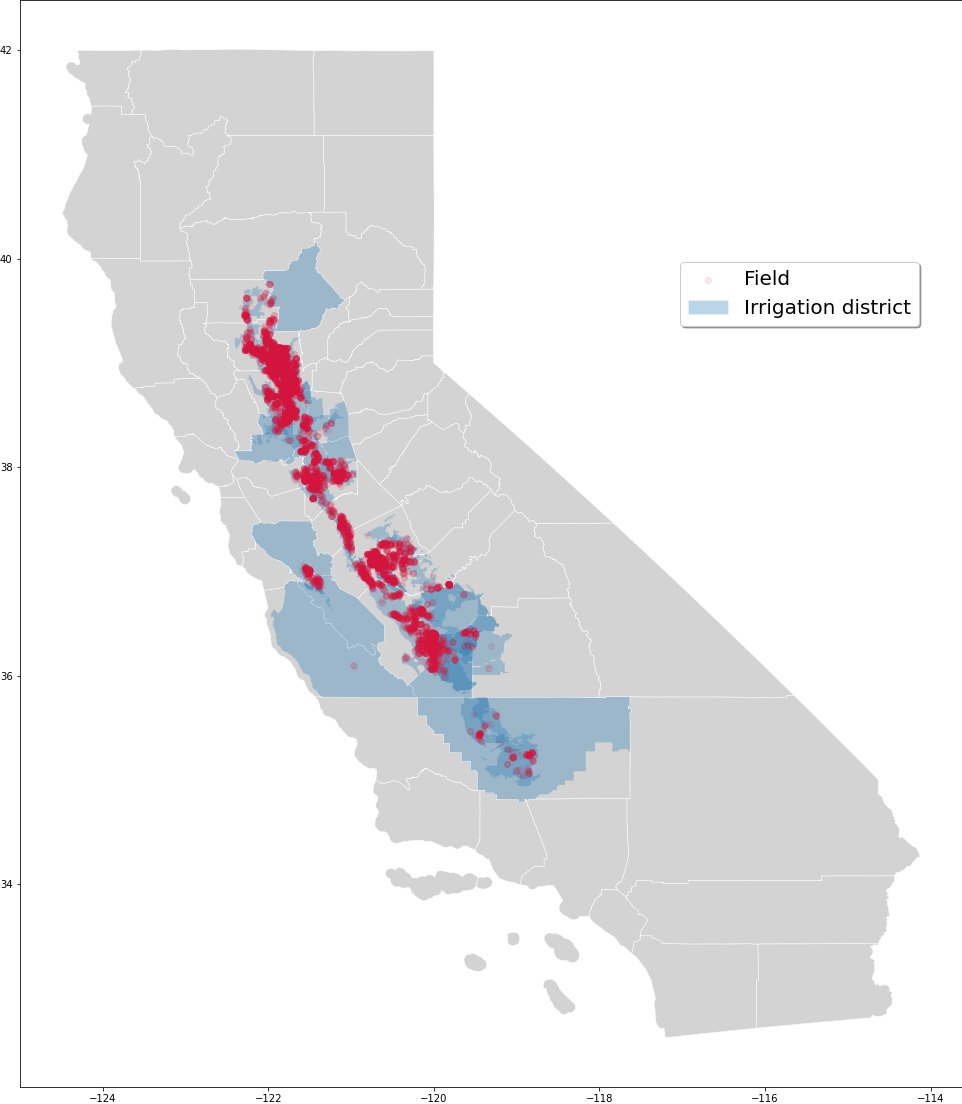Research
Working papers
Climate Change and Labour Market Strain: Heat Stress Impacts on Farmworker Productivity and Farm Viability (With Katie Ricketts)

In high-income countries, labour expenses represent a significant share of the overall costs of producing food. Farmwork is often physically demanding and outdoors, making agricultural workers among the most vulnerable populations to heat stress. In the context of Australia’s $18 billion fruits, vegetables, and horticultural (FVH) industries, we quantify the effect of increasing temperatures on labour productivity using climate projection models together with government datasets. We find that FVH workers will be significantly less productive by mid-century due to the psychological and physiological burden of hotter temperatures. We project higher operating costs for FVH farms that will need to pay for more working hours to achieve the same amount of work as the baseline period. The costs of reduced labour productivity double under an assumption of labour supply shortages like those experienced in other high-income agricultural industries. This is one of many mechanisms—alongside yield, quality, pest and disease pressure, and water availability—through which climate change threatens farm profitability and food system resilience.
Margins of Response to Water Scarcity in Irrigated Agriculture

Irrigated agriculture is vital for food security, but it relies on an increasingly variable and scarce water supply. I study the effect of water scarcity on farmers’ extensive and intensive margins on over 100,000 fields in California between 2010 and 2021. I find that during a water scarce year, growers engage in both intensive and extensive margin adjustments by roughly equal amounts. This work demonstrates agricultural producers engage in water-saving practices more than what has been previously found and that these practices help growers avoid fallowing, a more costly response.
Publications
Whitnall, S. C. & T. K. M. Beatty (2026). Climate Change and Field-Level Crop Quality, Yield, and Revenue. Journal of the Association of Environmental and Resource Economists, 13(1), 261-291. Link.
Press: National Geographic.
Whitnall, S. C. & T. K. M. Beatty (2025). Postharvest losses from temperature during transit: Evidence from a million truckloads. American Journal of Agricultural Economicss. Link.
Press: Morning Ag Clips.
Whitnall, S. C. & J. M. Alston (2025). Climate, weather, and collective reputation: Implications for California’s wine prices and quality. Journal of Wine Economics, 20, 122–167. Companion piece to HDSR publication. Link.
Whitnall, S. C. & J. M. Alston (2025). Implications of Climate Change for Prices of Ultra-Premium Cabernet Sauvignon Wines From California. Harvard Data Science Review, 7(2). Companion piece to JWE publication. Link.
Cuffey, J., K. Newby, & S. Smith (2024). Social Inequity in Administrative Frictions: Evidence from SNAP. Public Administration Review, 84(2), 338-356. Link.
Smith, S. C. & D. Ubilava (2017). The El Niño Southern Oscillation Cycle and Growth in the Developing World. Global Environmental Change 45, 151-164. Link.
Outreach Material
Ricketts, K. & S. Whitnall (2025). From Heat Stress to Economic Stress: Exploring the Future of Australian Agricultural Labour and Productivity. Farm Policy Journal, Australian Farm Institute. Link.
Smith, S. (2017). Wheat. Agricultural Commodities: December quarter 2017 ABARES, Canberra. Link.
Smith, S. (2017). Wheat quality explained. Agricultural Commodities: September quarter 2017 ABARES, Canberra. Link.
Smith, S. (2017). Wheat. Agricultural Commodities: September quarter 2017 ABARES, Canberra. Link.
Smith, S. (2017). Wheat. Agricultural Commodities: June quarter 2017 ABARES, Canberra. Link.
Smith, S. (2017). Wheat outlook. Agricultural Commodities: March quarter 2017 ABARES, Canberra. Link.
Smith, S. & A. Cameron (2017). Horticulture outlook. Agricultural Commodities: March quarter 2017 ABARES, Canberra. Link.
Brown, A., J. Fell, S. Smith & H. Valle (2016). Australian grains: Outlook for 2016–17 and industry productivity. ABARES report prepared for the Grains Research and Development Corporation ABARES, Canberra.
Smith, S. (2016). Wheat. Agricultural Commodities: December quarter 2016 ABARES, Canberra. Link.
Smith, S. (2016). The EU almond industry. Agricultural Commodities: September quarter 2016 ABARES, Canberra. Link.
Smith, S. (2016). Wheat. Agricultural Commodities: September quarter 2016 ABARES, Canberra. Link.
Smith, S. & J. Hogan (2016). Trade in fresh fruit and vegetables. Agricultural Commodities: June quarter 2016 ABARES, Canberra. Link.